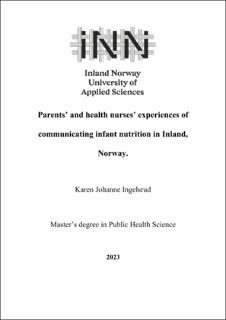| dc.contributor.advisor | | |
| dc.contributor.author | Ingelsrud, Karen Johanne | |
| dc.date.accessioned | 2023-07-01T16:10:31Z | |
| dc.date.available | 2023-07-01T16:10:31Z | |
| dc.date.issued | 2023 | |
| dc.identifier | no.inn:inspera:147863363:96736299 | |
| dc.identifier.uri | https://hdl.handle.net/11250/3075113 | |
| dc.description.abstract | Sammendrag
Bakgrunn: Kostholdsvaner som etableres i barndommen følger ofte inn i voksenlivet. Nasjonale retningslinjer for spedbarnsernæring danner grunnlaget for å introdusere fast føde til spedbarn i Norge. Mens disse anbefaler et sunt kosthold bestående av kjøtt, fisk, bønner, frukt og grønnsaker, viser rapporter et høyt forbruk av industrialiserte babymatprodukter. Ettersom overvekt og fedme blant barn er en økende global utfordring, er det viktig å utforske opplevelsene knyttet til kommunikasjon om spedbarnsernæring mellom foreldre og helsesykepleiere, samt fra ytterligere informasjonskilder som foreldre bruker om dette emnet, og hvordan disse påvirker kostholdsvalgene de tar for sine barn, spesielt når det gjelder industrialiserte produkter.
Teori: Nasjonale rapporter og tidligere forskning om industrialisert mat, veiledning og intervensjoner for et sunt kosthold til spedbarn ble brukt til å informere denne studien. Funnene i denne studien er i hovedsak forstått innenfor begrepet empowerment, konseptualisert av N. Kabeer gjennom de tre overlappende dimensjonene; ressurser, handlefrihet og prestasjoner (resources, agency and achievements).
Metoder og mål: Et kvalitativt casestudiedesign, utført med FGDer og semi-strukturerte intervjuer med helsesykepleiere og foreldre i Innlandet fylke i Norge. Hensikten var å gi bedre forståelse av opplevelsene med formidling av spedbarnsernæring ved helsestasjonen, og dens innvirkning på bruken av industrialisert barnemat.
Resultater og konklusjon: Funnene viser positive og negative sider ved bruk av Internett som en kilde til informasjon om spedbarnsernæring for å myndiggjøre (empower) foreldre og helsesykepleiere. Resultatene indikerer at åpenhet i kommunikasjon foretrekkes av de fleste foreldre, samt utfordringer som helsesykepleiere står overfor når de arbeider for å styrke foreldrenes autonomi. Funn kan ha implikasjoner for videreutvikling av informasjonsmateriell og potensielt styrke foreldre som opplever utfordringer i kostholdsvalg, og for beslutningstakere som regulerer markedsføring av industrialisert barnemat. | |
| dc.description.abstract | Abstract
Background: Dietary habits that are established in childhood are shown to often follow into adulthood. The National Guidelines on infant nutrition are the basis for introducing solid foods to infants in Norway. While these recommend a healthy diet consisting of meat, fish, beans, fruit and vegetables, reports show a high consumption of industrialized baby food products. As childhood overweight and obesity are increasing worldwide, it is important to explore the experiences in communicating infant nutrition between parents and health nurses as well as additional sources of information the parents use regarding this topic, and how these impact the dietary choices they make for their infants, particularly regarding industrialized products.
Theory: National reports and previous studies on the topic of industrialized food, infant nutrition guidance and interventions opting for a healthy diet was used to inform this research. The findings in this study are mainly understood within the concept of empowerment, conceptualized by N. Kabeer with the three interrelated dimensions, resources, agency and achievements.
Methods and aim: A qualitative case study design, conducted with FGDs and semi-structured interviews with health nurses and parents in Inland County, Norway. The purpose was to provide better understanding of the experiences in communicating infant nutrition at the public health center, and its impact on the use of industrialized baby food.
Results and conclusion: Findings show positive and negative sides of Internet as a source of infant nutrition information to empower parents and health nurses. Results indicate openness in communication is preferred by most parents, and challenges faced by the health nurses while working to empower parents’ autonomy. Findings may have implications for further development of information material and potentially empower parents who experience challenges in dietary choices, and for policymakers regulating marketing of industrialized baby food. | |
| dc.language | eng | |
| dc.publisher | Inland Norway University | |
| dc.title | Parents’ and health nurses’ experiences of communicating infant nutrition in Inland, Norway. | |
| dc.type | Master thesis | |
